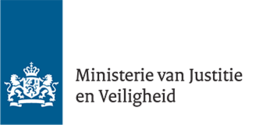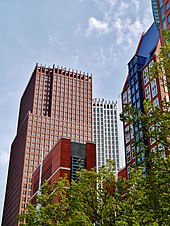Ministry of Justice and Security
The Ministry of Justice and Security (Dutch: Ministerie van Justitie en Veiligheid; JenV) is the Dutch ministry responsible for justice, imprisonment and public security. The ministry was created in 1798 as the Department of Justice, before it became in 1876 the Ministry of Justice. In 2010, it took over the public safety duties from the Ministry of the Interior and Kingdom Relations and became Ministry of Security and Justice. In 2017 the ministry was renamed to Ministry of Justice and Security. The ministry is headed by the Minister of Justice and Security, David van Weel (NSC) since 2 July 2024.
| Ministerie van Justitie en Veiligheid | |
 | |
 Current head office | |
| Department overview | |
|---|---|
| Formed | March 12, 1798 |
| Jurisdiction | Kingdom of the Netherlands |
| Headquarters | Schedeldoekshaven 100, The Hague, Netherlands |
| Employees | 30,000 |
| Annual budget | €11,1 billion (2018)[1] |
| Minister responsible |
|
| Deputy Ministers responsible |
|
| Website | Ministry of Justice and Security |
Responsibilities
editThe ministry has the legal tasks of:
- providing workable legislation for the public, the government and the courts;
- preventing crime, in order to build a safer society;
- protecting youth and children;
- enforcing the law, in order to build a safer society;
- providing independent, accessible and effective administration of justice and legal aid;
- providing support to the victims of crime;
- providing fair, consistent and effective enforcement of punishment and other sanctions;
It is also responsible for the coordination of counter-terrorism policy. The ministry oversaw migration policy until the separate Ministry of Asylum and Migration was established in July 2024.[2]
Because it shares many responsibilities and has twin buildings (both old and new) with the Ministry of the Interior and Kingdom Relations, they are sometimes called the twin ministries.
Organisation
editThe ministry is headed by Minister David van Weel, who is supported by State Secretaries Ingrid Coenradie (Justice and Security) and Teun Struycken (Legal Protection). It employs almost 30,000 civil servants, located at the ministry in the Hague and all around the Netherlands. The ministry's main office is located in the centre of the Hague in the same building as the Ministry of the Interior and Kingdom Relations. The civil service is headed by a secretary-general and a deputy secretary-general, who head a system of three directorates-general:
- The Directorate-General for Legislation, International Affairs and Immigration
- The Directorate-General for Prevention, Youth and Sanctions
- The Directorate-General for the Administration of Justice and Law Enforcement
The Board of Procurators General (Dutch: Raad van Procureurs-Generaal) which heads the Public Prosecution Service (in Dutch: Openbaar Ministerie, OM) is a relatively independent organisation which forms part of the Judiciary and prosecutes persons suspected of breaking the law.
The Netherlands Forensic Institute is an autonomous division of the Ministry of Justice, falling under the Directorate-General for the Administration of Justice and Law Enforcement. The Custodial Institutions Agency is an agency of the ministry.
See also
editReferences
edit- ^ Zaken, Ministerie van Algemene (4 July 2017). "Miljoenennota en Rijksbegroting - Prinsjesdag - Rijksoverheid.nl". www.rijksoverheid.nl. Archived from the original on 4 October 2018. Retrieved 4 October 2018.
- ^ Meijer, Remco (2 July 2024). "De machtsoverdracht op Justitie: 'Wij houden van de oude bewindslieden en zoeken een nieuwe relatie'" [The transfer of power at Justice: 'We like the old government members and are looking for a new relationship']. de Volkskrant (in Dutch). Retrieved 8 July 2024.